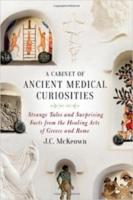
Oxford (2016) h/b 268pp £12.99 (ISBN 9780190610432)
McK., professor of classics at Wisconsin-Madison in the USA, already has form in this area. His co-edited The Hippocrates Code (reviewed on this website) makes for an excellent introduction to the language and practice of Hippocratic medicine, with an emphasis on the meaning of the ancient Greek stems and endings now in common use in the English medical vocabulary; and his earlier entertaining Cabinets of general Greek and Roman curiosities consist of fully referenced translations, with brief comment, of passages illustrating ‘strange tales and surprising facts’ on topics such as families, women, foreigners, sex, animals, athletics, tourism and so on, e.g. ‘I congratulate you on coming to philosophy untainted by any education (Epicurus Letters fr. 43)’.
His work on the The Hippocrates Code has clearly inspired this, his latest Cabinet, which is in the same format as the earlier Cabinets and also very entertaining, but benefits from its concentration on a single topic. As he freely admits in the Preface, it is also as much about real-life medical practice as medicine itself, with an emphasis on ‘the odd, the bizarre and the downright weird’, and little about the ‘rational and scientific aspects of ancient medical thought’. He suggests that if you wish to try out any of the remedies for yourself, consult your doctor, and if he or she agrees to more than a minuscule percentage, change doctors at once. The following selections from the fourteen chapters will give the happy purchaser some idea of what (s)he is in for:
‘When Euryphon the doctor was asked with which teacher he had studied, he replied “With Time”’ (Stobaeus Anthology 1.8)
‘It frequently happened to me in my travels that, when either I myself or one of my attendants fell ill, I had dealings with doctors who were fraudulent in a variety of ways; some of them sold very ordinary medicines at highly inflated prices, and others were driven by greed to take on cases that they had no idea how to cure’ (Gargilius Martialis Appendix to Medicina Plinii Preface).
‘Human teeth contain a sort of poison; baring one’s teeth in front of a mirror dulls its brightness, and it also kills fledgling pigeons’ (Pliny NH 11.170)
‘Penile erection is caused by air. This is an obvious inference from the speed with which swelling and detumescence occur. No liquid could cause such a rapid change …’ (Galen The Affected Places 8.44IK).
‘Once it is established that an erection is caused by air carried in by the arteries, it does not take much to determine that priapism, involuntary erection, is caused by flatulence’ (Galen Causes of Symptoms 7.267K).
‘People who gamble have short arms, like weasels, and enjoy dancing’ (Pseudo-Aristotle Physiognomonica 808a)
‘If a person whispers in a donkey’s ear that he has been stung by a scorpion, the affliction is immediately transferred to the donkey’ (Pliny NH 29.58)
‘When your patient has a gout attack, you should have him stand on the seashore—not the dry beach, but at the water’s edge—with his feet on a black electric eel. He should do this till he feels numbness in his whole foot and his leg as far as the knee. This not only stops the pain on this particular occasion but also prevents it recurring in the future. Anteros, the emperor’s freedman responsible for inheritances, cured himself using this method’ (Scribonius Largus Prescriptions 162).
‘How to deal with tattoos, from the works of Archigenes: you can remove tattoos by smearing on them a mixture of very sharp vinegar and the stuff that sticks to the side of a chamber pot’ (Paul of Aegina Medical Compendium 4.7)
‘An ointment for bald patches. Take four drachmas of pepper; dried sheep dung, hedge mustard, and arugula seed, three drachmas of white hellebore and mouse droppings, and mix these ingredients up with the gall of a bull or a goat or a pig’ (Oribasius Select Prescriptions 4.1)
‘According to Galen, the coccyx bone is so called because the winds that come out from there through the fundament make a sound like “cuckoo” when they strike against it. It is a metaphor from the bird that goes “cuckoo”’ (Meletius On the Nature of Man 111)
So now you know.
Peter Jones
